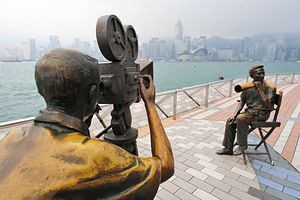When it comes to suppression in China, there are a lot of particular dates to remember — far more than strictly necessary. There’s the Tiananmen anniversary when the internet slows to a crawl and dissidents are rounded up; the “two sessions” (the National Party Congress and Chinese People’s Political Consultative Conference) with media outlets screaming propaganda and quashing dissent; National Day, depending on the year of course; and the Hong Kong handover anniversary. Plus, you can be sure that if there’s an Expo or an Olympics near you, you’re going to be encouraged to keep utterly quiet. And, for the folks of the Beijing Independent Film Festival, there’s the yearly censure of their low-key movie gala.
Despite the fact that the festival organizers said their film selections this year were not critical of the government, it’s pretty much tradition at this point. Many of the past 11 festivals have been disrupted or cancelled by Beijing police: last year’s attendees had to watch DVDs in small groups, and the year before police simply cut the electricity to the venue. It turned out to be a pretty standard Beijing crackdown: cameras were broken, phones were stolen, offices were broken into and vandalized, and the plainclothes police officers pretended not to be police at all (this time, they insisted they were villagers).
Going back to the start in 2006, Li Xianting, the founder of the festival, has always been at the heart of the event. He released a timeline of suppression this year, published on the excellent China Media Project in an article by David Bandurski. It began on August 18: “Posters and screening schedules for the 11th Annual Beijing Independent Film Festival are released on the internet. Police guards are posted outside the door of my home.” Both Li Xianting and artistic director Wang Hongwei were detained.
Li Xianting has been accused of stirring up trouble more than once. In response, he wrote on WeChat on the day his film festival was shuttered: “So what does it mean to ‘stir up trouble’ (寻衅滋事)? Let me tell you: it is when those who have unrestrained power mobilize the police and stir up the ignorant masses and even local ruffians to lay siege to those things they regard as ‘illegal’ — which in fact are normal public events for the arts, for religion, or for rights defense.”
China, on the whole, has expressed a renewed interest in movies, and, obviously, the officially sanctioned Beijing International Film Festival, or BIF, doesn’t have to put up with plainclothes police and power cuts. In fact, the official film festival can expect no end of support from Hollywood stars like Adrien Brody and Oliver Stone, and is apparently in no mood for competition — even when it’s no competition at all.
There’s also Chollywood to consider. China’s richest man set up the world’s biggest film studio last year to the tune of 50 billion RMB, attracting the likes of Leonardo DiCaprio and Nicole Kidman. But, behind this investment, and Beijing’s interest Chinese cinema in general, lurks the question: “Why are Chinese movies so bad?” The reason, one might imagine, has something to do a lack of any dissenting voices. Non-government sanctioned events like the Beijing Independent Film Festival are not given any space at all from the state apparatus, cutting off a potential source of fresh ideas and new talents. So, while there is every reason in the world to believe that the “The Oriental Movie Metropolis ” will take off, movie lovers can only hope and pray that it doesn’t.

































